The Myers-Briggs® Personality Types with the Most and Least Friends
Do you ever wonder why it’s easy or difficult for you to make friends but someone else you know has a completely different experience? As an INTJ myself, I’ve often struggled to try to make friends. I go through periods, in fact, where I primarily focus on work and responsibilities and forego friendships altogether. In contrast, my ENFJ sister seems to attract friendships wherever she goes. Growing up, everyone wondered how we could possibly be related. “You’re sooooo quiet and serious!” they would say to me, and “She’s so bubbly and outgoing!” they would say about her.
What caused these differences? Was it our personalities?

As I’ve been conducting various surveys among my readers, I’ve noticed patterns emerging along the lines of friendships. I started noticing that people commenting were mentioning difficulties with friendships. In my emails every day, I get emails from specific types more often than others who are struggling to find friends or who are grappling with loneliness.
With that in mind, I decided to run a huge ‘Friendship Survey’ where I asked my readers, clients, friends, and followers about their friendship situations. How many friends did they have? Did they find it easy to make friends? Did they have a best friend? Today I want to go over the results of just those three questions (there were many more in the survey) to share some patterns and insights that I found along the way.
Keep in mind, no personality type is better than another. Some personality types might find it easier to make friends, but that doesn’t mean they are necessarily better people, more friendly, more caring, etc,. We are all wired differently, with unique talents, strengths, and, yes, weaknesses. This blog post is not a judgment call on anyone for having an easier or harder time making friends. It’s merely a look at the patterns and then potentially, the struggles, of the 16 personality types when it comes to friendships.
Let’s get started!
Not sure what your personality type is? Take our thorough personality questionnaire here. Or you can take the official MBTI® here.
First, let’s take a look at the demographics:
I received 4,862 responses to my friendship survey. The majority (79.76%) were female, 18.62% were male, 0.94% chose not to answer, and 0.67% identified as non-binary. The age distribution of respondents was as follows:
- 24.29% were between 45-54 years old.
- 19.97% were between 55-64 years old.
- 17.81% were between 35-44 years old.
- 17.68% were 65+ years old.
- 7.02% were between 18-24 years old.
- 6.34% were between 25-34 years old.
- 6.07% were between 0-17 years old.
Table of contents
- First, let’s take a look at the demographics:
- Extroverts vs. Introverts: Friendships and Challenges
- The Social Butterflies and the Lone Wolves
- The ESFP
- The ISFP
- The ENFJ
- The INFJ
- The ESTJ
- The ISTJ
- The ENFP
- The INFP
- The ESFJ
- The ISFJ
- The ENTP
- The INTP
- The ESTP
- The ISTP
- The ENTJ
- The INTJ
- What Are Your Thoughts?
Estimated reading time: 22 minutes
Extroverts vs. Introverts: Friendships and Challenges
The survey revealed a stark contrast between Extroverts and Introverts in terms of their social connections and challenges. 13.63% of introverts reported having no friends at all, while only 1.33% of extroverts reported having zero friends. In turn, when asked the question, “Do you find it easy to make new friends?” 79.01% of introverts answered “No,” while only 23.27% of extroverts answered “No.”
These same patterns showed up in whether or not the types were likely to have a best friend. 42.94% of introverts reported having no best friend, while only 27.57% of extroverts had no best friend.
The Social Butterflies and the Lone Wolves
The ESFP
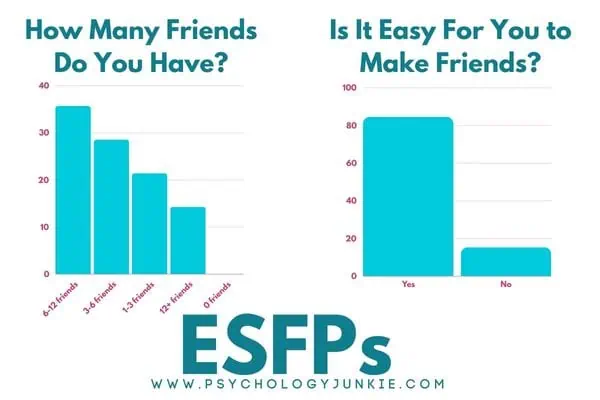 ESFPs, often known as “The Entertainers” or “The Champions,” live up to their name with a wide and varied group of friends. 30.77% of ESFPs reported having 6-12 friends, and another 30.77% indicated having 3-6 friends. Meanwhile, 23.08% of ESFPs have 12 or more friends, highlighting their ability to form and maintain a broad circle of relationships. Only 15.38% of ESFPs reported having just 1-3 friends, emphasizing their preference for a larger social network.
ESFPs, often known as “The Entertainers” or “The Champions,” live up to their name with a wide and varied group of friends. 30.77% of ESFPs reported having 6-12 friends, and another 30.77% indicated having 3-6 friends. Meanwhile, 23.08% of ESFPs have 12 or more friends, highlighting their ability to form and maintain a broad circle of relationships. Only 15.38% of ESFPs reported having just 1-3 friends, emphasizing their preference for a larger social network.When it comes to making new friends, the majority of ESFPs find it a breeze. 84.62% of ESFPs stated that they found it easy to make new friends. My ESFP friend Kay once told me, “I don’t really have to think about making new friends. I worry a little when I move somewhere new, but it always happens. It takes almost no time to find my people.”
And what about besties? 76.92% of ESFPs reported having a best friend, someone they can confide and depend on most. These statistics help us to see why ESFPs have earned their reputation for being social butterflies!
Find out more about ESFPs: 7 Ways That ESFPs Make an Impact
The ISFP
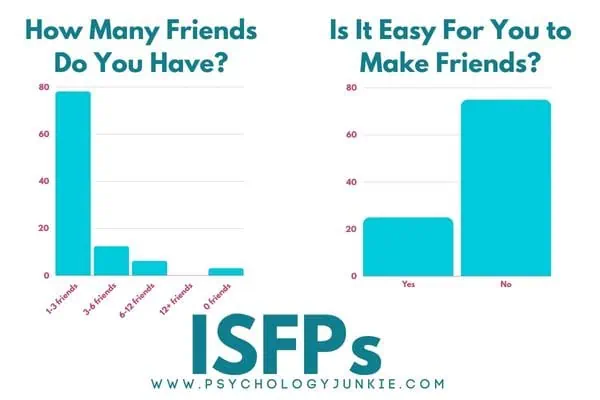 Unlike their extroverted ESFP counterparts, ISFPs prefer keeping their social circles small but meaningful. 78.13% of ISFPs reported having 1-3 friends, and many admit they get overwhelmed by large friend groups. Some ISFPs extend their social circle slightly, with 12.50% having 3-6 friends, and only 6.25% having 6-12 friends. Only 3.13% of ISFPs have zero friends, which is the lowest percentage of any of the introverted personality types.
Unlike their extroverted ESFP counterparts, ISFPs prefer keeping their social circles small but meaningful. 78.13% of ISFPs reported having 1-3 friends, and many admit they get overwhelmed by large friend groups. Some ISFPs extend their social circle slightly, with 12.50% having 3-6 friends, and only 6.25% having 6-12 friends. Only 3.13% of ISFPs have zero friends, which is the lowest percentage of any of the introverted personality types.Making new friends can be a challenge for ISFPs, with 75% admitting it is not easy. Their independent nature and tendency to be slow to trust might contribute to this stat. However, once they do form a bond, it often results in a meaningful and lasting relationship. One ISFP in the survey said, “I find it hard to put myself out there, but the few friends I have are like family to me.
When it comes to best friends, the data shows that 31.25% of ISFPs do not have a best friend, potentially due to their individualistic streak and high standards for trust. Despite these challenges, those ISFPs who do manage to form close bonds appreciate friends who give them space. They want a deep, meaningful relationship while still having the opportunity to have long bouts of solo time for creativity and exploration.
Discover more about ISFPs: Are ISFPs Rare? Unleashing the Mystery
The ENFJ
 ENFJs certainly lived up to their charismatic reputation. A significant portion of them enjoy an active social life, with 50% having 3-6 friends, 26.92% having 1-3 friends and 15.38% with 6-12 friends. Interestingly, 7.69% of ENFJs enjoy the company of 12 or more friends, which sounds exhausting to me, but I’m sure is quite fulfilling to the ENFJs out there!
ENFJs certainly lived up to their charismatic reputation. A significant portion of them enjoy an active social life, with 50% having 3-6 friends, 26.92% having 1-3 friends and 15.38% with 6-12 friends. Interestingly, 7.69% of ENFJs enjoy the company of 12 or more friends, which sounds exhausting to me, but I’m sure is quite fulfilling to the ENFJs out there!When it comes to making new friends, ENFJs excel, with 73.08% stating that they find it easy to make new friends. Their ability to quickly build rapport and read the room helps them to have a leg up in socializing and making a good impression.
And what about best friends? 80.77% of ENFJs have a best friend; the highest percentage of any of the 16 Myers-Briggs® personality types. This high percentage highlights their aptitude for nurturing a close, supportive relationship. They’re not just about quantity, they definitely care about quality the most.
Find out more about ENFJs: The Blessing and the Curse of Being an ENFJ Empath
The INFJ
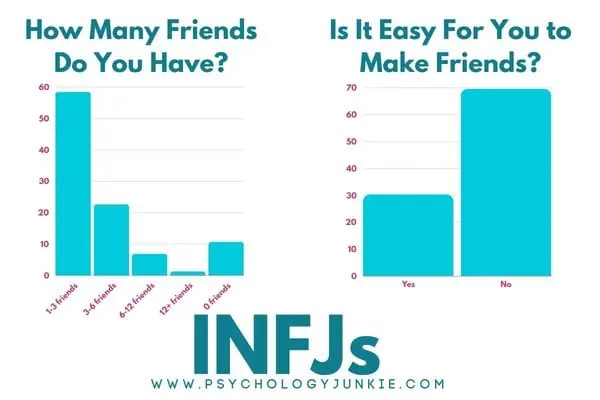 The “Mystics” are known for their depth, empathy, and desire to help others. Yet, when it comes to friendships, INFJs tend to keep their circles small and intimate. According to my survey, 58.49% of INFJs reported having 1-3 friends, while 22.64% have 3-6 friends. A notable 10.69% of INFJs said they have no friends at all. On the rare side, 6.92% reported having 6-12 friends, and only 1.26% have 12 or more friends.
The “Mystics” are known for their depth, empathy, and desire to help others. Yet, when it comes to friendships, INFJs tend to keep their circles small and intimate. According to my survey, 58.49% of INFJs reported having 1-3 friends, while 22.64% have 3-6 friends. A notable 10.69% of INFJs said they have no friends at all. On the rare side, 6.92% reported having 6-12 friends, and only 1.26% have 12 or more friends.INFJs often feel like they’re swimming against the current in social situations. They have a unique ability to focus on the intangible over the tangible, the abstract over the concrete. This gift is rare, but it’s also one that some people struggle to understand. 69.62% of INFJs said it’s not easy for them to make friends. 37.82% of INFJs don’t have a best friend. One INFJ stated, “My being quiet does not mean I don’t have thoughts or opinions, or that I am a snob. I need to study my surroundings and the people in it before revealing parts of myself. I am very private. I ask questions to others about them, but rarely if ever do people seem to want to know me.”
For the INFJ, depth rather than breadth is key in a friendship. They want to be intellectually challenged, engaged in thought-provoking discussion, and surrounded by people who care about improving the world. Once an INFJ finds a trustworthy friend, they are fiercely loyal and compassionate. Yet unfortunately, they are often misunderstood. According to my latest survey, they are the type most likely to feel misunderstood.
Find out more about INFJs: Two Inspiring Morning Routines for INFJs
The ESTJ
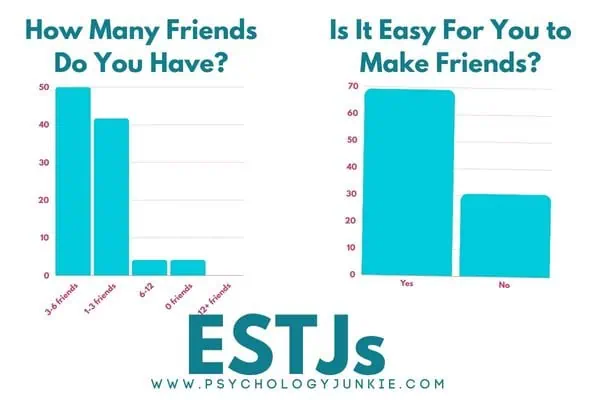 Now let’s move on to “The Captains.” According to my survey, about 50% of ESTJs reported having 3-6 friends, 41.67% of ESTJs have 1-3 friends, and 4.16% have 6-12 friends, showcasing a range of social networks within this type. Sadly, 4.16% of ESTJs reported having zero friends.
Now let’s move on to “The Captains.” According to my survey, about 50% of ESTJs reported having 3-6 friends, 41.67% of ESTJs have 1-3 friends, and 4.16% have 6-12 friends, showcasing a range of social networks within this type. Sadly, 4.16% of ESTJs reported having zero friends.When it comes to making new friends, ESTJs generally find it less challenging. 69.23% of ESTJs stated that they find it easy to make new friends, with many ESTJs commenting that they are deeply involved in their communities (churches, schools, etc,.) A big surprise for me also showed up in the survey results! While ESTJs have a reputation for being confident and assertive, 12.04% admitted to struggling with shyness. This just goes to show that even the most confident types can sometimes grapple with social anxieties.
Nevertheless, a majority of ESTJs manage to form close-knit relationships. 76.92% of ESTJs reported having a best friend. Despite some underlying social reservations, ESTJs’ commitment to their close friends and their ability to lead and organize can make them valued community leaders and guides.
The ISTJ

According to my survey, 73.53% of ISTJs reported having 1-3 friends, accumulating a small but trusted circle. A significant 11.76% have zero friends, while another 11.76% manage to have 3-6 friends. ISTJs with larger social circles are quite rare, with only 2.94% reporting 6-12 friends.
With their reserved and quiet nature, ISTJs often struggle to feel comfortable in the friend-making stage. 88.24% of ISTJs find it difficult to make new friends— the highest percentage among all 16 personality types. Their stoic and contained demeanor can be misleading – on the inside they care deeply and have very strong values. They may just look unreadable and distant on the outside.
As for best friends, 35.29% of ISTJs do not have one, potentially due to their slow-to-trust nature. ISTJs might come across as serious and distant, but spend some time with them, and you’ll discover a loyal and dependable friend who values a deep, meaningful connection. Their quiet strength and unwavering support make them a rock for those lucky enough to be in their inner circle.
Find out more about ISTJs: The Childhood Struggles of ISTJs
The ENFP
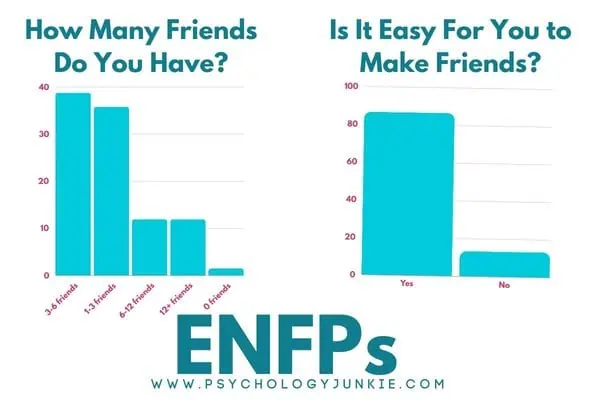 Now, let’s take a look at the “Visionaries,” the ENFPs. 38.81% of ENFPs have 3-6 friends, and a close 35.82% reported having 1-3 friends. For those with even broader networks, 11.94% have both 6-12 and 12+ friends. However, 1.49% of ENFPs have no friends, which is a reminder that even the most outgoing personalities can face social challenges.
Now, let’s take a look at the “Visionaries,” the ENFPs. 38.81% of ENFPs have 3-6 friends, and a close 35.82% reported having 1-3 friends. For those with even broader networks, 11.94% have both 6-12 and 12+ friends. However, 1.49% of ENFPs have no friends, which is a reminder that even the most outgoing personalities can face social challenges.But here’s where the magic really happens: A remarkable 86.57% of ENFPs find it easy to make new friends! After ESTPs, ENFPs were the types most likely to find it easy to make new friends. They have a spark, an energy, and a warmth that draws people to them like a magnet.
And what about best friends, those true companions who stand by you through thick and thin? 71.64% of ENFPs reported having a best friend. ENFPs are not just about the numbers; they crave relationships that inspire them, that are filled with shared dreams, adventures, and thought-provoking discussions. They want friends who can spark new ideas, embark on spontaneous adventures, and explore the world together.
The INFP
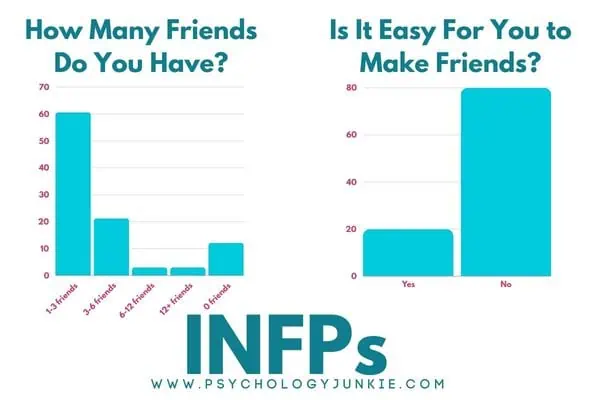
Now let’s delve into the world of the “Dreamers,” the INFPs. According to my survey, 60.61% of INFPs reported having 1-3 friends, while 21.21% have 3-6 friends. Sadly, 12.12% of INFPs said they have no friends, which coincides with 80% of them saying it’s not easy to make new friends. It’s quite rare for INFPs to have a wider social circle, with only 3.03% having 6-12 friends and another 3.03% counting 12 or more friends in their networks.
Relationships are a delicate matter to INFPs, often requiring a deep level of trust and emotional safety before they’re willing to open up. One INFP from the survey put it this way: “Until I get to know someone and trust them with my thoughts and feelings, I’m not very open to begin with. It’s a conundrum, I know.”
When it comes to best friends, 40% of INFPs don’t have one, but many long for one. One commenter said, “I’ve always wanted a best friend, kind of like Anne of Green Gables seeking her kindred spirit. But I’m 40 years old and I haven’t gotten there yet. However, my pets, books, and music are good company.” INFPs are idealists who seek meaningful connections that go beyond the superficial. They crave deep, soul-stirring conversations and shared values. While they may not gather hordes of friends, those they do let in will find an unparalleled loyalty and empathy, imagination, and possibility.
Find out more about INFPs: Two Inspiring Morning Routines for INFPs
The ESFJ
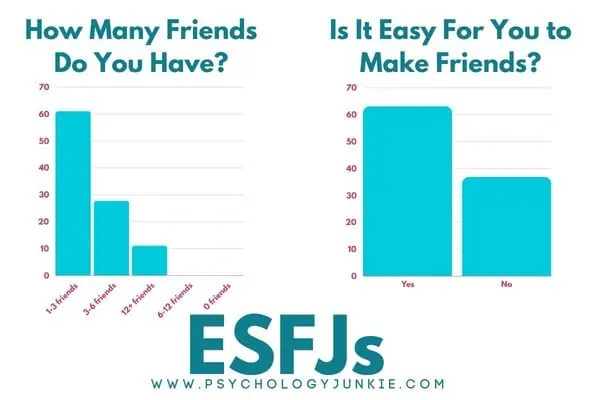 Known as “The Defenders,” ESFJs are known for their well-connected and socially active lives. 61.11% of ESFJs report having 1-3 friends, while 27.78% sustain a slightly larger circle of 3-6 friends. A smaller yet significant portion, 11.11%, thrive in even larger groups, with 12 or more friends. When it comes to forging new relationships, ESFJs generally find it straightforward, with 63.16% stating that they find it easy to make new friends. This ease in social situations is likely enhanced by their genuine interest in others and their nurturing nature.
Known as “The Defenders,” ESFJs are known for their well-connected and socially active lives. 61.11% of ESFJs report having 1-3 friends, while 27.78% sustain a slightly larger circle of 3-6 friends. A smaller yet significant portion, 11.11%, thrive in even larger groups, with 12 or more friends. When it comes to forging new relationships, ESFJs generally find it straightforward, with 63.16% stating that they find it easy to make new friends. This ease in social situations is likely enhanced by their genuine interest in others and their nurturing nature.In terms of deep, lasting friendships, ESFJs tend to have a bestie; 78.95% of ESFJs have a best friend. ESFJs are incredibly active within their communities, often participating in various social and volunteer activities in their religious communities, schools, and neighborhoods. They are well-known for their generosity and their penchant for bringing people together. Whether it’s planning community events, lending a helping hand, or working collaboratively on team projects, ESFJs are happiest in environments that allow them to connect with others and contribute positively to group efforts.
The ISFJ
 Now let’s step into the world of the “Protectors,” the ISFJs. Loyal and dedicated, they may not surround themselves with giant masses of friends, but the ones they do have they tend to be deeply committed to. In my survey, 61.90% of ISFJs report having 1-3 friends, building small circles that they can count on. 21.43% of ISFJs find themselves in the company of 3-6 friends. On the other hand, 11.90% of ISFJs have no friends, a statistic that reveals the struggle many of the introverted types face socially. Even fewer, 4.76%, have 6-12 friends, showing just how rare it is for ISFJs to surround themselves with a larger social network.
Now let’s step into the world of the “Protectors,” the ISFJs. Loyal and dedicated, they may not surround themselves with giant masses of friends, but the ones they do have they tend to be deeply committed to. In my survey, 61.90% of ISFJs report having 1-3 friends, building small circles that they can count on. 21.43% of ISFJs find themselves in the company of 3-6 friends. On the other hand, 11.90% of ISFJs have no friends, a statistic that reveals the struggle many of the introverted types face socially. Even fewer, 4.76%, have 6-12 friends, showing just how rare it is for ISFJs to surround themselves with a larger social network.Now, when it comes to forming new friendships, ISFJs face significant hurdles. 73.81% of ISFJs say it’s not easy to make new friends, many struggling to initiate conversations or attend a lot of social gatherings. One ISFJ summed it up perfectly, saying, “I’m not a snob but quiet, and people misunderstand that.” This highlights a common misperception about ISFJs; they embody the phrase “still waters run deep,” and they need someone with patience and support to get them to really open up.
Best friends? Let’s talk about that. 56.10% of ISFJs don’t have a best friend, the highest percentage among all 16 personality types. This could be due to their cautious approach to trust and openness. However, for those few who cross that threshold, an ISFJ’s friendship is steadfast and unwavering. They might not be in the limelight at social events, but their quiet, gentle presence can be a comforting anchor for those they care about.
Find out more about ISFJs: Are ISFJs Rare? A Look at the Protector Personality Type
The ENTP
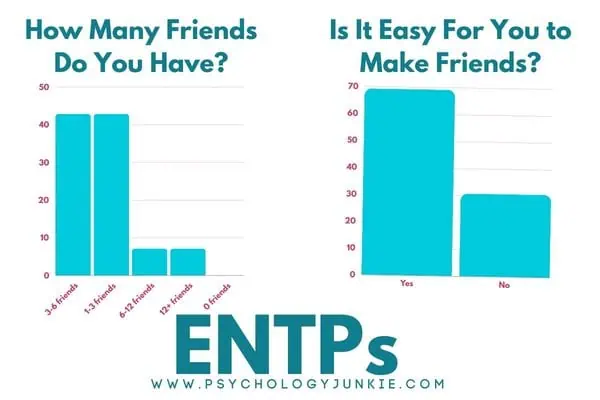 Now let’s enter the world of the “Debaters,” the ENTPs. According to my survey, 42.86% of ENTPs report having 1-3 friends, while another 42.86% enjoy a slightly larger circle of 3-6 friends. A smaller portion, 7.14%, find themselves surrounded by 6-12 friends, and an equally small 7.14% maintain a social network of 12 or more friends. ENTPs have a knack for collecting a diverse and interesting array of companions, thanks in large part to their charismatic and engaging personalities.
Now let’s enter the world of the “Debaters,” the ENTPs. According to my survey, 42.86% of ENTPs report having 1-3 friends, while another 42.86% enjoy a slightly larger circle of 3-6 friends. A smaller portion, 7.14%, find themselves surrounded by 6-12 friends, and an equally small 7.14% maintain a social network of 12 or more friends. ENTPs have a knack for collecting a diverse and interesting array of companions, thanks in large part to their charismatic and engaging personalities.When it comes to making new friends, ENTPs have an easy time of it. 69.23% of ENTPs say they find it easy to make new friends, often owing to their quick wit and conversational prowess. One ENTP chimed in, sharing, “My irreverent sense of humor can land me in trouble with more uptight people, but those who like me REALLY like me. And if they don’t like me, it doesn’t really bother me too much. I’m fairly confident approaching people and getting to know them.”
However, the world of best friendships is a bit different for ENTPs. 30.77% of ENTPs reported having no best friend, which might surprise some. This could be attributed to their independent spirit and the broad range of interests that keep them perpetually exploring new possibilities. One commenter said, “I like all my friends and don’t really feel it’s fair to put them in categories like ‘best friend'”. Despite this, ENTPs often leave a lasting impression on those who do become close, offering a friendship filled with stimulating conversation, endless curiosity, and a mindset that constantly challenges the norm.
Find out more about ENTPs: 24 Signs That You’re an ENTP, the Trailblazer Personality Type
The INTP
 Now let’s look at the “Prodigies.” Known for their intellectual prowess and innovative ideas, INTPs often chart their own course through the social landscape. According to my survey, 60.42% of INTPs report having 1-3 friends, while another 27.08% enjoy a slightly larger circle of 3-6 friends. A smaller segment, 10.42%, find themselves with no friends, and an even smaller 2.08% have a social network of 6-12 friends. INTPs tend to value quality over quantity when it comes to friendships, seeking out those who can engage with them on a deeper, more intellectual level.
Now let’s look at the “Prodigies.” Known for their intellectual prowess and innovative ideas, INTPs often chart their own course through the social landscape. According to my survey, 60.42% of INTPs report having 1-3 friends, while another 27.08% enjoy a slightly larger circle of 3-6 friends. A smaller segment, 10.42%, find themselves with no friends, and an even smaller 2.08% have a social network of 6-12 friends. INTPs tend to value quality over quantity when it comes to friendships, seeking out those who can engage with them on a deeper, more intellectual level.When it comes to making new friends, INTPs face a significant challenge. A striking 81.25% of INTPs say they find it difficult to form new connections, likely due to their reserved and independent nature and preference for solitary pursuits. One INTP shared, “I love diving deep into my thoughts and ideas; sometimes, social interactions just don’t provide the same level of stimulation.” This highlights a common thread among INTPs — their friendships often require a shared appreciation for deep conversation and mutual respect for each other’s intellectual and personal space.
Speaking of deeper connections, what about best friends? Interestingly, 45.83% of INTPs reported having no best friend, making it the third-highest percentage among all 16 personality types, following behind ISFJs and INTJs. This might surprise some, but it aligns with the INTP’s preference for independence and how some can struggle to prioritize socializing and events where a lot of people will be present. It can be difficult to form close friendships when there are so many interesting things to do in your alone time!
Find out more about INTPs: All About the INTP Personality Type (The Prodigy)
The ESTP
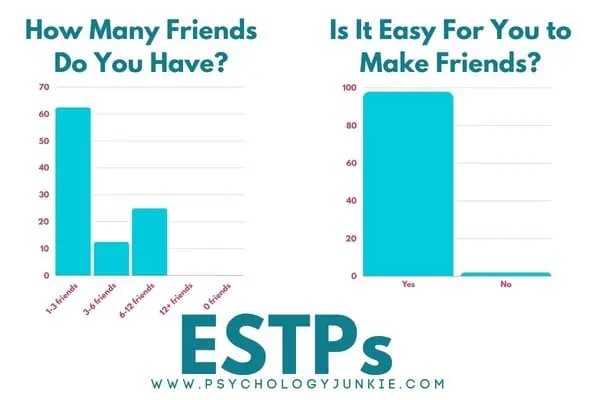 According to my survey, 62.50% of ESTPs report having 1-3 friends, while 25% enjoy a slightly larger circle of 6-12 friends. A smaller group, 12.50%, have a close-knit group of 3-6 friends. When it comes to making new friends, ESTPs seem to have a natural talent. Only 2% find it difficult to make new friends, the lowest percentage among all 16 personality types. One ESTP summed it up perfectly, saying, “It’s easy for me to go up and make introductions and get the banter going. Socializing is not hard for me. I know how to keep things upbeat and fun.”
According to my survey, 62.50% of ESTPs report having 1-3 friends, while 25% enjoy a slightly larger circle of 6-12 friends. A smaller group, 12.50%, have a close-knit group of 3-6 friends. When it comes to making new friends, ESTPs seem to have a natural talent. Only 2% find it difficult to make new friends, the lowest percentage among all 16 personality types. One ESTP summed it up perfectly, saying, “It’s easy for me to go up and make introductions and get the banter going. Socializing is not hard for me. I know how to keep things upbeat and fun.”However, best friendships can be more of a challenge. 25% of ESTPs reported having no best friend, which may come as a surprise given how easy it is for them to make new friends. This could be due to their busy and active lifestyle, which can sometimes lead to a focus on broader social circles rather than more one-on-one, intimate relationships. Despite this, those who do manage to get close to an ESTP often find a friend who’s spontaneous, adventurous, and always ready to bring a bit of excitement to their lives.
The ISTP
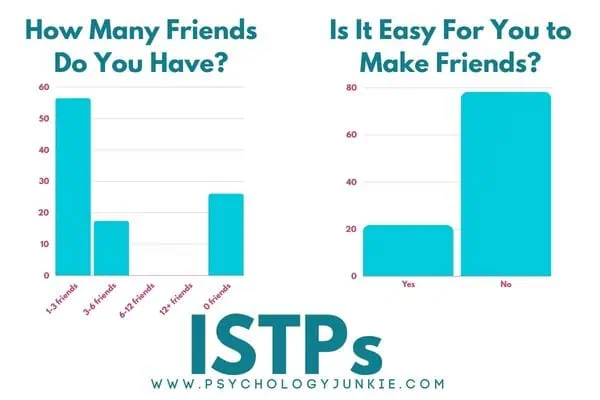 ISTPs, the “Vigilantes,” are known for their practical nature and love for hands-on activities. According to my survey, 56.52% of ISTPs report having 1-3 friends, while another 17.39% find themselves with 3-6 friends. Sadly, ISTPs have the largest percentage of individuals with no friends among all personality types, standing at 26.09%. This might be due to their independent spirit and disdain for being tied down. While some types love socializing and chit chat, ISTPs tend to find it maddeningly dull.
ISTPs, the “Vigilantes,” are known for their practical nature and love for hands-on activities. According to my survey, 56.52% of ISTPs report having 1-3 friends, while another 17.39% find themselves with 3-6 friends. Sadly, ISTPs have the largest percentage of individuals with no friends among all personality types, standing at 26.09%. This might be due to their independent spirit and disdain for being tied down. While some types love socializing and chit chat, ISTPs tend to find it maddeningly dull.Making new friends can be somewhat challenging for ISTPs, but many don’t mind. For instance, 27.50% of ISTPs said they don’t feel the need for new friends, while 15% state that they are simply too busy for friendships and 10% find friendships too much work. Meanwhile, 17.50% cite “shyness” as a significant reason for their difficulty in forming friendships. Reflecting this, a significant percentage, 78.26% of ISTPs, say it is not easy for them to make new friends. Furthermore, 43.48% of ISTPs reported having no best friend.
One ISTP shared their perspective, saying, “I would enjoy having a good friend, but I’m also really content on my own. Getting through the small talk and boredom of social events often doesn’t feel like a good trade-off for me. I’d rather be on my motorcycle.” This kind of comment is typical of many ISTPs, showing that while they do value deep connections, their independent nature often takes precedence.
Find out more about ISTPs: 24 Signs That You’re an ISTP, the Vigilante Personality Type
The ENTJ
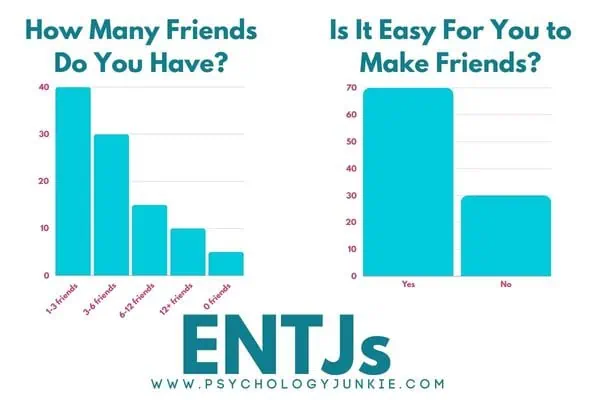
ENTJs, known as the “Captains,” are natural-born leaders with a knack for strategic thinking and decisive action. According to my survey, 40% of ENTJs report having 1-3 friends, 30% enjoy the company of 3-6 friends, while 15% have a broader social network of 6-12 friends. Interestingly, 10% of ENTJs boast an even larger circle with more than 12 friends. However, there is a small segment, 5% of ENTJs, who reported having no friends.
When it comes to making new connections, ENTJs seem to have a natural flair. 70% of ENTJs say it is easy for them to make new friends, with one remarking, “I don’t see what’s so scary about talking to people.” Yet, forming deep bonds can be a bit more challenging. 49% of ENTJs reported having no best friend, which may come as a surprise given their sociable nature. One ENTJ explained it well, saying, “It’s easy for me to make casual friends, but it’s harder to find people who I actually would call if something went wrong. I’m busy and most of my friends are busy. I’m more likely to prioritize my family over making new friends.” This sentiment captures the essence of the ENTJ’s approach to relationships — they value depth and reliability, but often find that their packed schedules leave little room for investing in deeper friendships.
Find out more about ENTJs: 10 Signs of an Unhealthy ENTJ
The INTJ
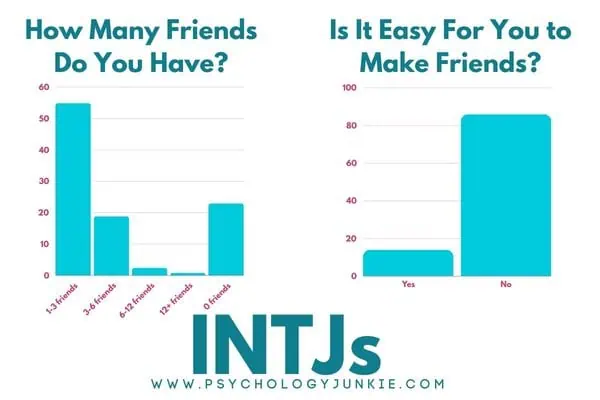
INTJs, often referred to as the “Strategists” or “Masterminds,” are renowned for their strategic minds and independent spirits. According to my survey, 54.92% of INTJs report having 1-3 friends, while 18.85% find themselves with 3-6 friends, and a tiny fraction, 2.4%, have 6-12 friends. A rare few, 0.82%, boast an even larger circle with more than 12 friends. However, a significant 22.95% of INTJs reported having no friends, making them the second most likely personality type to have zero friendships, just after ISTPs.
This solo tendency might explain why 85.95% of INTJs say it is not easy for them to make new friends. An INTJ’s natural inclination towards autonomy and valuing alone time often takes precedence over socializing. Yet, this doesn’t mean they don’t want friendships. One INTJ candidly shared, “I get the impression people feel I’m judging them, I’m not, I’m genuinely curious. I want to know what their processes were in choosing something. I think they’d prefer it if I validated rather than questioned.”
When it comes to best friends, 53.78% of INTJs reported having none. Despite the perception of emotional distance, the friendships that INTJs do form are often marked by depth, shared intellectual pursuits, and mutual respect. It’s in these rare connections that INTJs find a space where their genuine curiosity and intellectual prowess can be appreciated and reciprocated.
Find out more about INTJs: Two Inspiring Morning Routines for INTJs
What Are Your Thoughts?
Do you struggle to find friends or does it come naturally? What advice would you give to someone else with your personality type, or perhaps another, more contrasting, type? We’d love to hear your thoughts and opinions so let us know in the comments!
Discover even more about your personality type in our eBooks, Discovering You: Unlocking the Power of Personality Type, The INFJ – Understanding the Mystic, The INTJ – Understanding the Strategist, and The INFP – Understanding the Dreamer. You can also connect with me via Facebook, Instagram, or Twitter!



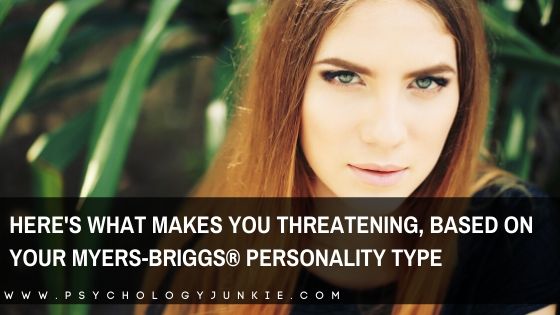
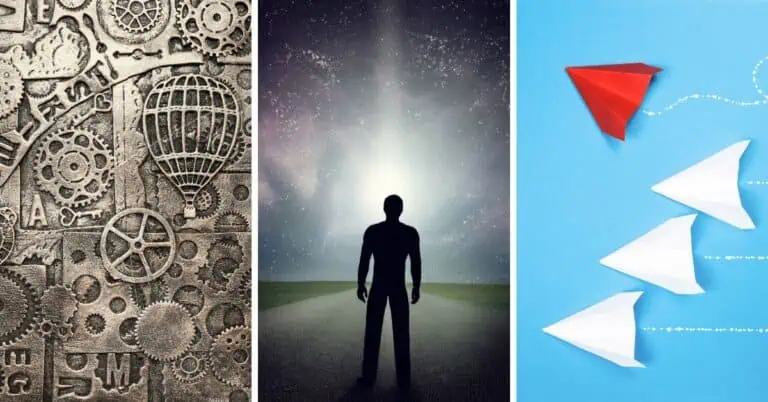
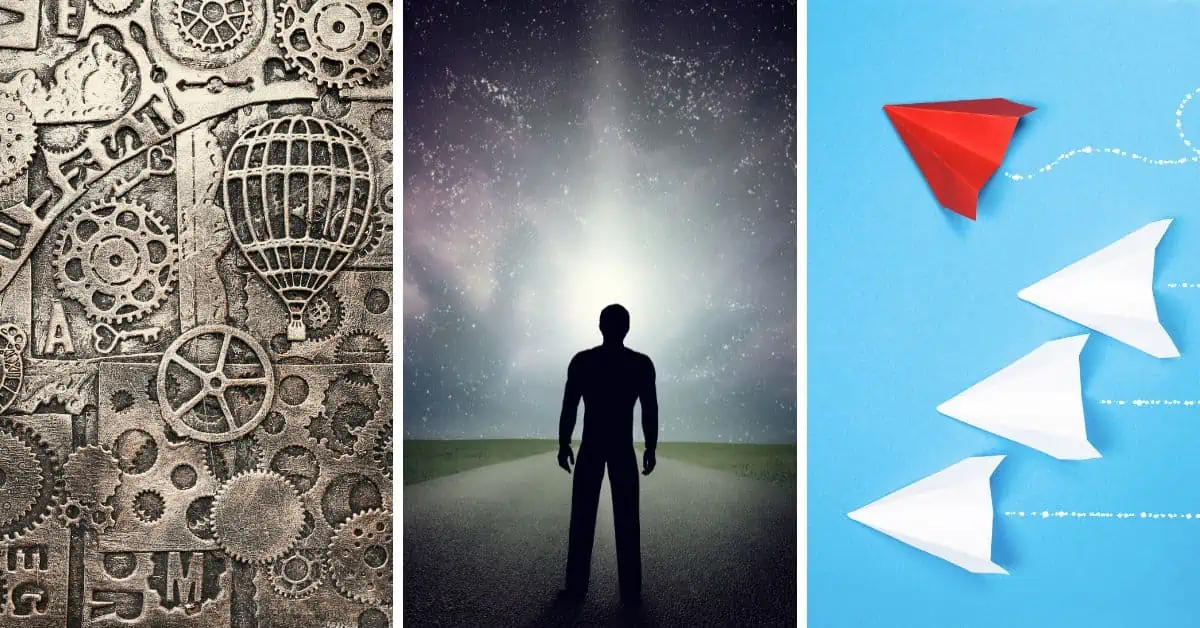

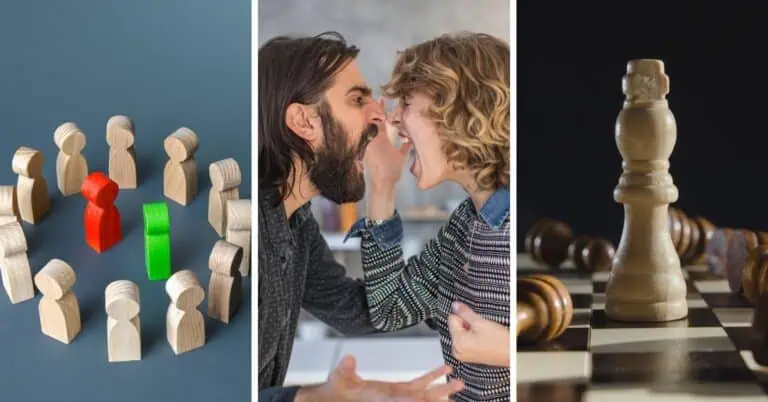

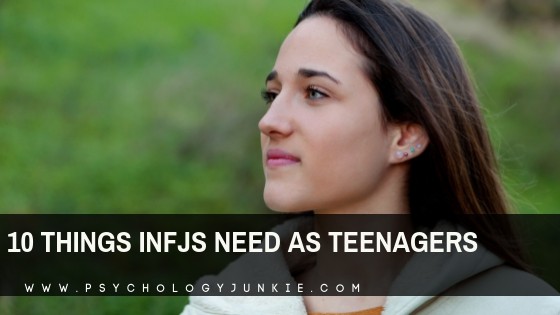
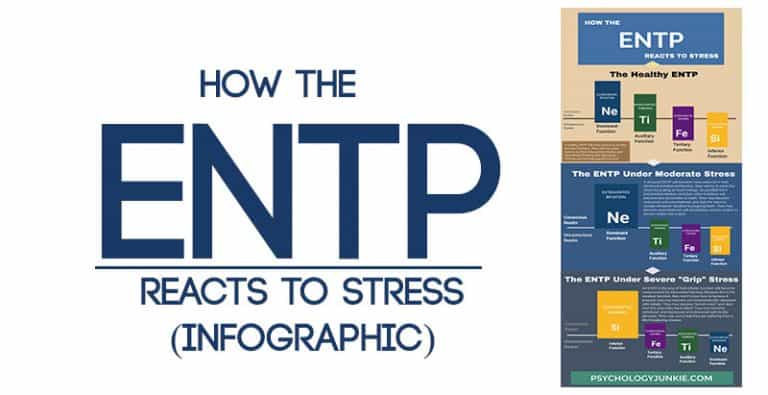
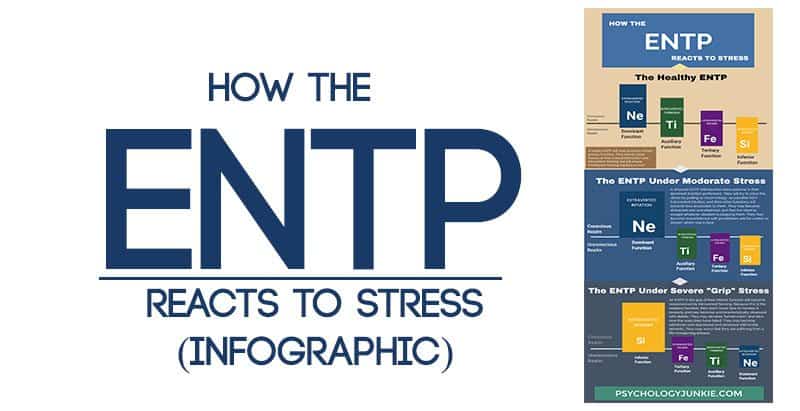
INTJ here and so I certainly concur with these results.
I am from the U.S. but I have lived in Latin America for nine years. I will venture to say that at least 85% of people here are sensors. It is an in-the-moment society with little to no planning.
Very few people are interested in in-depth discussions or conceptual topics. Lots of small talk about mundane happenings. I have adjusted to that but long for what I had before. Because of distance and the passage of time most old friendships have waned. It is an “out of sight, out of mind” situation. Also, loss due to death or chronic illnesses on the other end.
I stay in touch but I have to initiate the contact. Still, I am rarely lonely. I have projects and some friends here now that I can speak Spanish.
True friends are more precious than gold–AND–about as hard to find…………
In school, i had about 2 close friends, plus 3 friends who i wouldn’t consider close because they chose to eat lunch with other people rather than me. I would’ve loved someone to share my deep thoughts with, but my friends tended to be unintelligent, shallow thinkers (ISFP). We were just friends because they were the few people who were nice to me and we had some common interests like anime. After high school, i moved out of state. I tried keeping in touch with my friends through the internet, but eventually they all stopped communicating. So now as an adult, i have no real life friends, only people i talk to on the net who live far away.
My elementary school ISTP daughter only has one friend, mainly because she is too shy. But even when other kids try to befriend her, she won’t bother being nice to them if she isn’t interested in being their friend. She seems content having just one friend, just like she only wants to have one interest; once she finds a new interest, she loses interest in the old thing.
Have you defined “friend”?
I’m an introvert, but I’d say I have a fair number of friends. Some I may not have spoken with in over a years, but I know we are there for one another when a need arises. How do you identify those friends?
I enjoy reading these surveys Ms. Storm. In particular, I find the age in your demographics quite interesting.
As for this topic, my initial thought was that Ti type users like myself are capable of making that fine distinction between who they consider friend as opposed to acquaintance. Yet, INTP types seem to not show high on having 0 friends. Maybe it’s a Ti-Se/Si-Te thing?
ENTP.
I had many friends when I was 0-22
But after age 22 (I’m 27 now) i have 2 close friends (INFJ and ISFJ) , one of em is my truly best friend (INFJ, we’re together for 13,14years) and i don’t have any interest in being that close to others, like i have 4,5 friends and we do stuff but i don’t tell them everything or go out with them that much. Also my brother have a son who is ENTJ and I’m sooo close to him too. he’s 19 .
About, is it easy to find new friends, i have to say that it’s easy but, on the water, if you wanna go deeper, it’s not that easy .
Like i talk to strangers and they want to see or talk to me more but i don’t like it that way , just wanna stay shallow with them . It’s not that i don’t like them it’s just that i don’t like to open up and be vulnerable and do emotions with them and share my thoughts and feelings and….